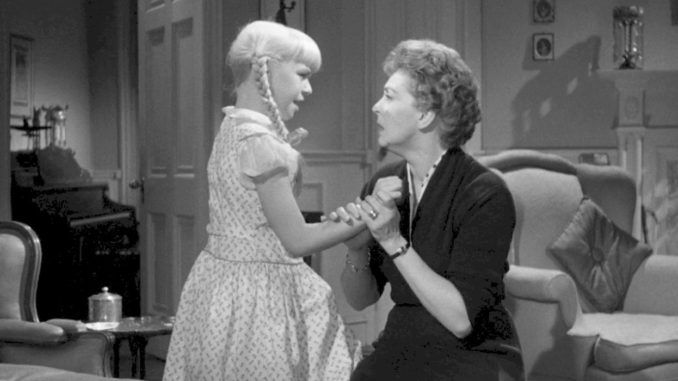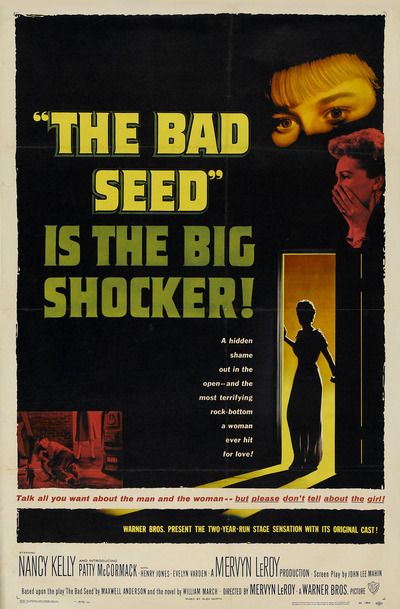
Rating: C-
Dir: Mervyn LeRoy
Star: Nancy Kelly, Patty McCormack, Evelyn Varden, Henry Jones
This is based on a play, itself inspired by William March’s novel. The rights to it sold for $300,000, then a very large sum, after a bidding war between studios. The sale was despite warnings from the Production Code Administration, the de facto censors of fifties Hollywood as enforcers of the Hays Code, about the problematic nature of any film adaptation. Their concerns forced Warner Bros. to flip-flop the ending and ensure the guilty did not get away with their crimes. But being an adaptation of a play remains frequently obvious, both in the nature of the staging, and performances (many from members of the Broadway cast) which often seem aimed at the back of the dress circle.
Until the end, the story remains faithful to the source. After her husband leaves on his military service, Christine Penmark (Kelly) begins to suspect her 8-year-old daughter Rhoda (McCormack) is a psychopath, following the young girl’s involvement in the death of a classmate on a school trip. This brings into sharp focus Christine’s concerns about her own origins, and the question of whether nature or nature is more important in establishing a child’s psychology. Though the person with the best handle on Rhoda’s tendencies is caretaker Leroy Jessup (Jones). He threatens to take his suspicions to the police, with evidence to back them up. Needless to say, that cannot be allowed to happen, and the resulting incident pushes Christine over the edge.
 Which is how we get to a really ridiculous, Old Testament ending – albeit one approved by the PCA! – in desperate need of a Biblical quote as a postscript. Colossians 3:25 would seem appropriate. It’s somewhat in line with a moderately hysterical tone throughout, with a lot of the performances considerably “bigger” than necessary for the cinema screen. None more so than Eileen Heckart as Hortense Daigle, mother of the dead child who is now permanently intoxicated. She got a Best Supporting Actress nomination at the Oscars, but it felt to me like a severe case of overacting. The same goes, to varying degrees, for most of the cast members, resulting in a melodramatic tone. It’s at its best when at its most restrained, such as Rhoda detailing exactly what happened to her classmate.
Which is how we get to a really ridiculous, Old Testament ending – albeit one approved by the PCA! – in desperate need of a Biblical quote as a postscript. Colossians 3:25 would seem appropriate. It’s somewhat in line with a moderately hysterical tone throughout, with a lot of the performances considerably “bigger” than necessary for the cinema screen. None more so than Eileen Heckart as Hortense Daigle, mother of the dead child who is now permanently intoxicated. She got a Best Supporting Actress nomination at the Oscars, but it felt to me like a severe case of overacting. The same goes, to varying degrees, for most of the cast members, resulting in a melodramatic tone. It’s at its best when at its most restrained, such as Rhoda detailing exactly what happened to her classmate.
The film is also largely confined to the Penmark’s apartment. LeRoy seems content to reflect the staging of the play, rather than taking advantage of the freedoms offered by the film medium. At 129 minutes, he may also have been slavishly devoted to the play’s text too. There are a number of scenes that go on past their purpose, where they have one at all. However, the second half fares better than the first, as Christine is hit with a series of disturbing shocks about her and her daughter. Definitely a shame they had to adjust the ending, and the awkward curtain-call for the cast which follows, culminating in Christine spanking Rhoda, has not aged well. Rather disappointing, to be honest.
